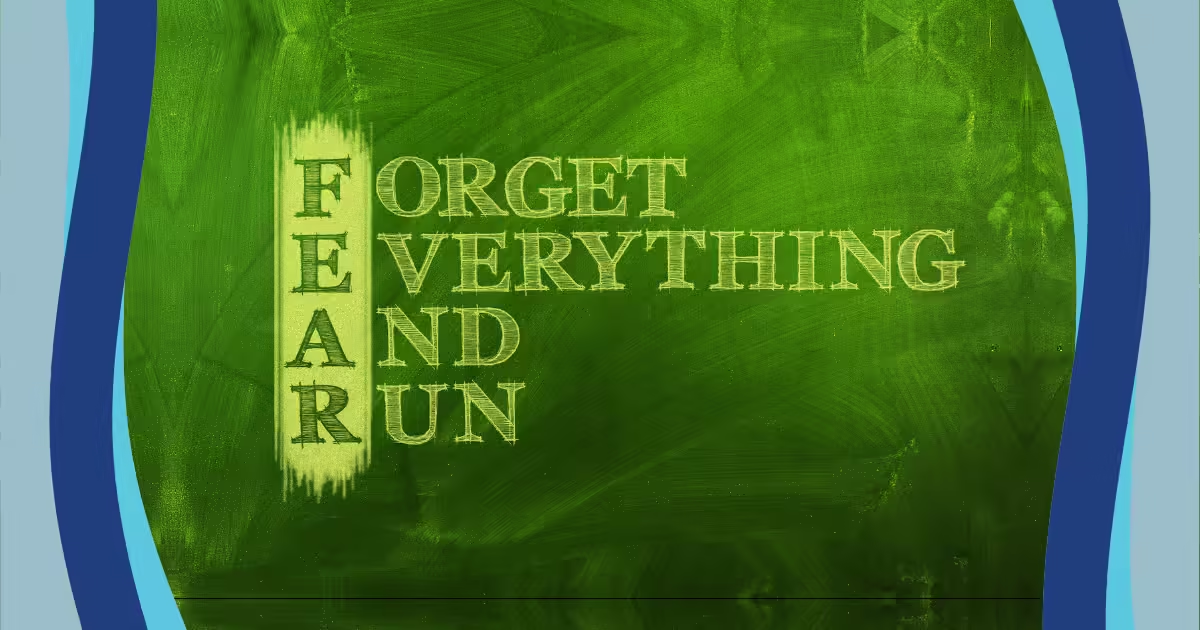Fear is a natural emotion that every person experiences at different points in life. It can protect us from danger, but it can also hold us back from achieving our goals and dreams. Understanding fear is essential to overcoming it, and one effective way to tackle fear is by using fear acronyms that can shift your perspective and help you respond with courage. Acronyms for fear are short, memorable phrases that redefine the concept of fear, transforming it from something that paralyzes us into a force that motivates and empowers us.
In this article, we’ll break down some of the most powerful and popular fear acronyms, explain how they work, and explore how you can apply them to your life to overcome anxiety and step into a more confident version of yourself.
What Does the Fear Acronym Stand For?
At its core, fear is an emotional response to perceived danger or threats, but in many cases, the fear we experience is irrational or based on false assumptions. This is where fear acronyms come into play. Acronyms provide a simple way to redefine fear, changing how we perceive it and giving us tools to overcome it.
The most well-known fear acronym is:
- False Evidence Appearing Real
This acronym highlights the idea that most of our fears are based on scenarios or outcomes that haven’t happened yet. It suggests that our fears often stem from misperceptions or false evidence that we’ve built up in our minds. By seeing fear as “false evidence,” we can start to question its validity and take steps toward overcoming it.
Another popular acronym for fear is:
- Face Everything and Rise
This acronym offers an empowering perspective on fear. Instead of running from what scares us, it encourages us to face our fears head-on and rise above them. By confronting fear, we can build resilience and grow stronger.
These acronyms offer a fresh perspective on fear, transforming it from an obstacle into an opportunity for growth and self-improvement.
Breaking Down the Fear Acronym: Common Meanings
Let’s take a closer look at some of the most common fear acronyms and their meanings. Each acronym sheds light on a different aspect of fear and provides insight into how we can overcome it.
1. False Evidence Appearing Real
- As mentioned earlier, this is one of the most widely recognized fear acronyms. It emphasizes how fear often arises from false beliefs or assumptions we create in our minds. By realizing that these fears are based on “false evidence,” we can start to dismantle the irrational thoughts that fuel our anxiety.
2. Face Everything and Rise
- This acronym turns fear into a call to action. Instead of letting fear hold you back, it encourages you to confront it and rise above the challenges. By taking proactive steps, you can gain control over your fear and use it as a stepping stone to success.
3. Forget Everything and Run
- This acronym reflects a common response to fear—avoidance. When we’re faced with something scary, our instinct may be to run away or ignore the problem. While this acronym points to a less empowering approach, it also serves as a reminder that avoidance often leads to more anxiety in the long run.
4. Focus Energy and Revitalize
- This lesser-known acronym reminds us that fear can be an opportunity to refocus our energy. Instead of succumbing to fear, we can use it as motivation to redirect our energy toward something positive and revitalize our approach to life’s challenges.
5. Feel Excited and Ready
- This acronym flips fear on its head. Instead of viewing fear as something negative, it suggests that the physical sensations of fear—such as a racing heart or butterflies in your stomach—can also be interpreted as excitement. By changing your mindset, you can reframe fear as excitement, helping you feel more ready to take on new challenges.
These acronyms show that fear doesn’t have to control us. By redefining fear through simple phrases, we can shift our mindset and approach fear in a more productive and empowering way.
How Fear Acronyms Help You Overcome Anxiety
Fear acronyms are powerful because they offer a mental shortcut that can immediately change how we think about fear. They take complex emotions and break them down into simple, memorable phrases that we can easily recall when we’re feeling anxious or afraid.
Here’s how fear acronyms can help you overcome anxiety:
1. Reframing Your Mindset
Fear acronyms encourage us to reframe how we perceive fear. Instead of seeing fear as an insurmountable barrier, these acronyms show us that fear can be questioned, challenged, and even embraced. This change in mindset can help reduce anxiety and make us feel more in control.
2. Interrupting Negative Thought Patterns
When we’re anxious, our minds tend to spiral into negative thoughts. Fear acronyms act as a pattern interrupt. By repeating a simple phrase like “False Evidence Appearing Real,” you can stop the cycle of negative thinking and remind yourself that your fears may not be based on reality.
3. Empowering Action
Many fear acronyms, such as “Face Everything and Rise,” promote taking action. Instead of being paralyzed by fear, these acronyms motivate us to face our fears, take small steps forward, and eventually overcome the anxiety holding us back.
4. Building Resilience
By using fear acronyms consistently, you can build resilience over time. Each time you confront your fear and rise above it, you gain more confidence in your ability to handle difficult situations. This resilience helps reduce the impact that fear has on your life.
Want to build a healthier lifestyle beyond just mindset shifts? Learn How Many Calories is a Roots Bowl and make your meal choices count here!
5 Powerful Fear Acronyms for Personal Growth
If you’re looking for some practical fear acronyms to help you grow personally and overcome challenges, here are five that you can apply in different aspects of life:
1. False Evidence Appearing Real (FEAR)
- Use this acronym whenever you feel overwhelmed by anxiety or doubt. Remind yourself that your fears may be based on false evidence and are not necessarily true. Challenge your fearful thoughts by asking, “Is this fear real, or is it something I’ve built up in my mind?”
2. Face Everything and Rise (FEAR)
- Whenever you’re tempted to avoid a difficult situation, use this acronym as a reminder to confront your fear. Facing your fears will help you build confidence and resilience, allowing you to rise above obstacles and grow.
3. Forget Everything and Run (FEAR)
- While this acronym represents a common response to fear, it can also serve as a reminder to pause and reflect. Instead of running away, ask yourself, “Am I avoiding this challenge because of fear? What would happen if I faced it instead?”
4. Focus Energy and Revitalize (FEAR)
- When you’re feeling anxious or unfocused, use this acronym to refocus your energy. Instead of letting fear drain you, channel your nervous energy into something productive that revitalizes your approach to challenges.
5. Feel Excited and Ready (FEAR)
- Before a big presentation, job interview, or life change, use this acronym to reframe your fear. Instead of viewing your nerves as fear, think of them as excitement. This mindset shift can make you feel more ready to tackle new challenges with enthusiasm.
These fear acronyms are practical tools that can help you manage anxiety, build courage, and foster personal growth in various situations.
Facing Fear with Acronyms: Practical Applications
Now that we’ve explored different fear acronyms, let’s look at some practical ways you can use them in everyday life:
1. Before a Big Decision
When facing an important decision, it’s normal to feel fear of the unknown. Use a fear acronym like “False Evidence Appearing Real” to remind yourself that many of your fears may be based on uncertainty rather than actual danger. This can help you make decisions with more clarity.
2. In Public Speaking
Many people struggle with the fear of public speaking. Before stepping onto the stage, repeat the acronym “Feel Excited and Ready” to transform your nervousness into excitement. This mindset shift can help you feel more confident and energized when speaking in front of others.
3. During a Career Change
If you’re considering a career change but are held back by fear, use the acronym “Face Everything and Rise” as a personal mantra. Remind yourself that facing this new challenge can help you grow and develop in ways you never imagined.
4. In Relationships
Fear can often hold us back from forming deep and meaningful relationships. Use the acronym “Focus Energy and Revitalize” to shift your focus from fear to positive energy. This can help you approach relationships with a more open and optimistic mindset.
The Psychology Behind Fear and Acronyms
The reason why fear acronyms work so well is rooted in psychology. Acronyms are a form of cognitive reframing, which is a psychological technique that helps people view situations differently. By using simple phrases to redefine fear, you can retrain your brain to respond more positively to challenges.
1. Cognitive Behavioral Therapy (CBT)
One of the core principles of Cognitive Behavioral Therapy (CBT) is identifying and challenging negative thought patterns. Fear acronyms align with this approach by helping you recognize when your thoughts are irrational or based on false assumptions.
2. Neuroplasticity
Neuroplasticity refers to the brain’s ability to rewire itself based on new experiences and learning. By consistently using fear acronyms to reframe your thoughts, you can create new neural pathways that make it easier to respond to fear with courage and resilience.
3. Mindfulness
Fear acronyms also promote mindfulness. By bringing your attention to the acronym, you can become more aware of your fear response and actively choose to shift your perspective. This awareness is key to managing anxiety and reducing the power that fear has over you.
FAQs About Fear Acronyms
- What is a fear acronym?
- A fear acronym is a simple, memorable phrase that redefines the meaning of fear, offering a more positive or empowering perspective.
- How does the acronym “False Evidence Appearing Real” help with fear?
- This acronym highlights how most fears are based on irrational thoughts or assumptions that aren’t grounded in reality. Recognizing this can help reduce anxiety.
- Can fear acronyms really help overcome anxiety?
- Yes, fear acronyms can act as mental tools that interrupt negative thought patterns and encourage a more productive approach to fear.
- What is the purpose of the acronym “Face Everything and Rise”?
- This acronym encourages you to confront your fears directly instead of avoiding them, helping you grow stronger and more resilient.
- How can I use fear acronyms in my daily life?
- You can apply fear acronyms to situations where you feel nervous or anxious, such as making decisions, public speaking, or facing new challenges.
- What is the psychological benefit of using acronyms to overcome fear?
- Fear acronyms help you reframe negative thoughts, retrain your brain, and encourage mindfulness, all of which can reduce anxiety and build confidence.
- Are fear acronyms used in therapy?
- While not a formal therapy tool, fear acronyms align with techniques used in Cognitive Behavioral Therapy (CBT) to challenge negative thought patterns.
- How can fear acronyms improve public speaking confidence?
- By reframing your nervousness as excitement using acronyms like “Feel Excited and Ready,” you can approach public speaking with greater confidence.
- What is the difference between “False Evidence Appearing Real” and “Face Everything and Rise”?
- “False Evidence Appearing Real” focuses on recognizing the irrational nature of fear, while “Face Everything and Rise” promotes actively confronting fear.
- Can fear acronyms help with decision-making?
- Yes, fear acronyms can provide clarity when making tough decisions by reminding you that fear may be based on false assumptions or irrational thoughts.
Conclusion
Fear acronyms provide a powerful tool for reframing how we think about fear and anxiety. By turning fear into simple, memorable phrases, these acronyms help us challenge irrational thoughts, confront fears, and transform anxiety into action. Whether it’s False Evidence Appearing Real or Face Everything and Rise, these acronyms give us the mental framework to approach fear with courage and confidence.
In a world where fear can often hold us back from reaching our full potential, acronyms serve as a reminder that fear doesn’t have to control us. With practice, we can shift our perspective and use fear as a stepping stone toward growth, resilience, and personal development. Whether you’re dealing with anxiety in everyday situations or facing major life decisions, applying fear acronyms can help you take back control, rise above your challenges, and embrace the future with confidence.
By using these acronyms regularly, you can train your brain to handle fear more effectively and see it as an opportunity for growth rather than something to avoid. Fear may be a part of life, but how we respond to it is up to us. Let fear motivate you to rise and achieve your full potential!

Joseph Bush is a seasoned writer and researcher with over 7 years of experience covering a wide range of general topics, from lifestyle and technology to business and current events. He is dedicated to producing fact-checked, reader-friendly content that informs, engages, and empowers readers.
Throughout his career, Joseph has followed strict editorial guidelines, relied on reputable sources, and ensured every article meets the highest standards of accuracy and clarity. His expertise spans multiple fields, allowing him to explain complex topics in a way that’s easy to understand.
Passionate about continuous learning, Joseph stays updated on industry trends and best practices to deliver trustworthy, well-rounded insights. Readers can rely on his work for its credibility, depth, and real-world relevance.




